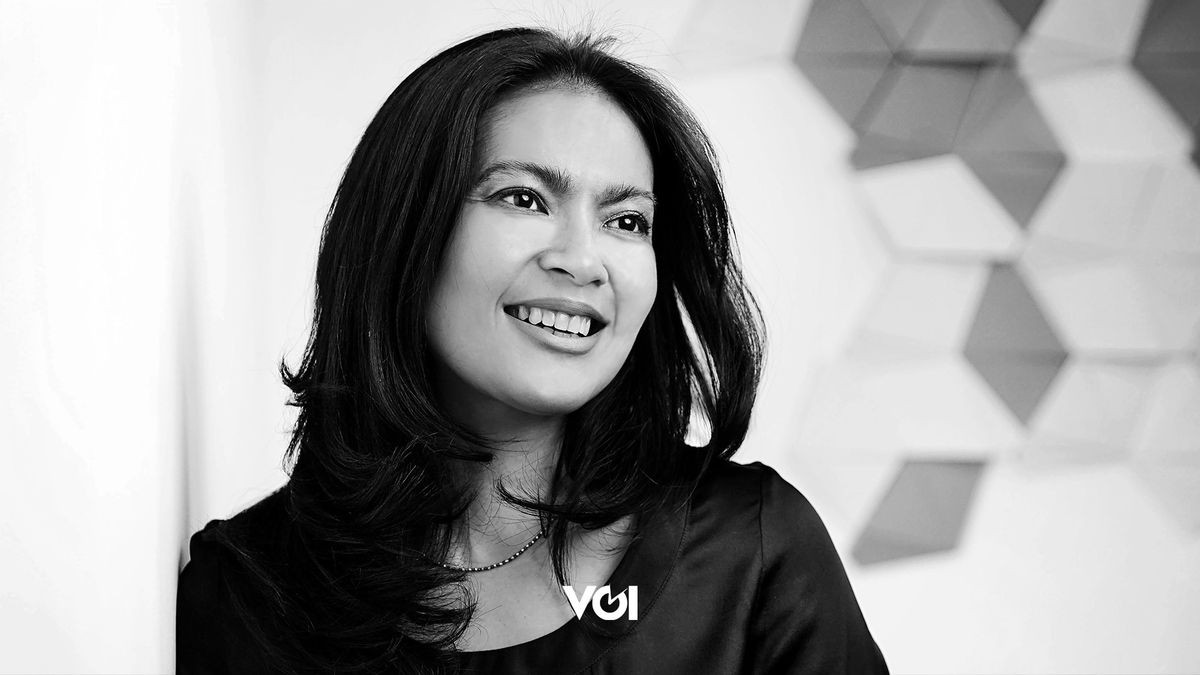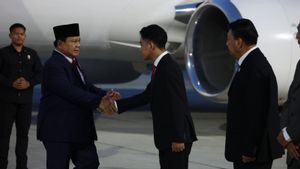JAKARTA - Director Lola Amaria has just released her latest film entitled Eksil which broadly tells the story of the life struggles of 10 political victims as a result of the outbreak of the 30 September 1965 Movement or commonly known as G30S PKI (Indonesian Communist Party) who were forced to be unable to return to their homeland, Indonesia, because it was considered to have no identity and was finally called an exile.
Through an exclusive interview with VOI, Lola Amaria explained in detail about her struggle for almost 10 years to be able to produce this film which cost up to billions of rupiah. Based on her curiosity as an Indonesian citizen about the history of her country, Lola Amaria took the courage to invite five other people to work on this film.
"So in 2010 I often received invitations to Europe, especially to Germany and the Netherlands. So, in the midst of my busy activities there, I was introduced to one of the exiles by a student friend of mine and we chatted at length and indeed I was a little curious when I was at school, maybe our generations were different so I was in elementary school for 6 years, middle school for 3 years, high school for 3 years. Well, that's 12 years, every year we are indoctrinated at school with a film called the film G30S," said Lola Amaria at the VOI office.
"So, to this day, I still have a dialogue in my memory that I will never forget, 'Blood is red, General'. And even now, people in my generation definitely know that the story line of the film has been brainwashed for years. Well, but until we were adults, we never knew what was wrong with the PKI, for example, why should we hate the PKI? Why do we have to say they are murderers, evil, bad, all negative without us ever knowing what they really do. Well, curiosity is what ultimately became a collection of puzzles which finally when we met this exiled student, it seemed like it was solved," she continued.

Lola said that it was not an easy matter for her to win the hearts of these exiles so that they would open up and tell their life stories to Lola Amaria and her team, because they were traumatized by new people who wanted to know about their lives. Lola said that it took her around 6 months to be able to make a personal approach to these exiles, assisted by friends in Germany, Amsterdam and Leiden.
Once in one of the cases of an exile named Ruslan, she and her team helped clean up his house in order to gain Ruslan's trust in her and her team so they could understand his daily life with his status as an exile.
"Well, it was stuck for several months, maybe around 5.6 months I stopped but I still wanted to film this, finally I tried talking to my friend who lives in Amsterdam in the Netherlands to ask for help. 'Sir, is it okay to take a personal approach to these exiles who really know that I really want to make a film, I'm independent, I don't have a party, I don't have an organization behind me, I really intend to, because this is interesting, we don't have anyone never know on this side'. So slowly, around 5 or 6 months, I got permission to use all kinds of cameras. Finally, after getting permission, I chose a team of 5 people to get ready to go filming," she explained.

"So, when we're filming, we make sure the five of us go to Mr. Ruslan's house, for example, Mr. Ruslan lives alone, he doesn't have a wife, so if we are guests, if we can cook, we'll cook there, or for example, after cleaning up dirty dishes, wash the dishes or clean up the house, wipe the rags," she recalled.
"So we do that, for example, when he washes the dishes, we say, 'It's okay, Sir, let's help, Sir, let's help,' then a dialogue occurs, 'I usually wash the dishes myself, I live alone', so it's more like children talking to with Dad. Then, if they are tired or sleepy, we'll come again tomorrow," said Lola.
Finally, in 2015, Lola was forced to start the filming process after receiving news that one of the exiles had died due to a heart attack. This made her realize that she was being pressed for time, because the exiles were no longer young. With strong and determined determination, Lola and her five team, who did not have any money, finally continued this project even though they had little money.
"Well, 2015 shouldn't be the right time for us to shoot because the money isn't enough, because we're going around Europe for 3 months, various countries and cities and there are 5 of us. So, when we weren't ready, one incident happened in July, if I'm not mistaken, June or May, one of our sources, Mr. Min Karjo, died, of a heart attack. Well, I had all the materials, finally when I died, I finally thought, 'Oh, this is already the old people, what if the others die too, it's a shame, right', finally I said to my team, 'Okay, sooner or later, I can't wait another year. we have to shoot this too'. Finally, with limitations, the five of us left in October 2015," she explained.
During the filming process, there was one story that Lola still remembers because it happened outside of her plan. Where she could get an interview with a family member of one of the exiles when she had never imagined this before. Starting from just taking pictures for fun, Lola and her crew got extraordinary prizes from this.
“But there was a moment where, it wasn't an instinct that wasn't in my concept but it was. For example, I had the concept for Mr. Min, then finally Mr. Min had a heart attack, died, then I didn't have any more source, then I was confused about what to do? But in the midst of my confusion, I said to my team, 'ok, let's take a stock shot of Mr. Min's grave in Leiden'. So, at that time, if I'm not mistaken, it was our holiday from filming, it was Saturday and I suddenly invited my team, 'oh, let's bring a camera, let's take a stock shoot of Mr. Min's grave in Leiden', we were living in Amsterdam at that time, right? An hour's journey using a camera," explained Lola.
"At 10 in the morning we left, around 11 o'clock we arrived, at 12 o'clock we arrived at the grave. Then I ordered the cameraman to take some ambience from detailed to wide atmosphere, maybe the birds, maybe the garden, maybe some gravestone name. Then, 10 minutes after we were there, my mixer came, 'Miss, Mr. Min has two children, they're going to get married', 'Huh, is that true? Can you please ask him whether he wants to be interviewed or not?' Finally, they were willing and so willing, I immediately called the cameraman, put the clip on, basically I asked questions which was spontaneous at that time," she added.
“Well, that wasn't in the concept, but it is the most important part of the film. That's the most important part in this film, the ending. Even though that wasn't in the concept at the beginning of the story, it was really fun when it got there. Because the only one who can speak English is Heru, he can't speak English, he can but it's broken, actually he can use Dutch, but I can't," she concluded.
Moral Responsibility to Exiles

Now Lola Amaria has succeeded in completing and bringing the film Eksil to be shown in selected cinemas in Indonesia after previously being screened and receiving awards as the best film at the Indonesian Film Festival (FFI), Jogja-NETPAC Asian Film Festival (JAFF), and Documentary Film Forum (FFD). Lola admitted that after finishing this film she felt that her question regarding what the PKI was had been answered from two points of view at once.
"Yes, answered. Answered and so there are two sides. So, turning around, which one do we want to believe? Because the doctrine was so strong, the curiosity became even stronger. And maybe there are many who don't care, it's really stupid for anyone, whether the PKI is evil or not, many don't care, which means we are apolitical, apathetic, all about matters concerning this country," added Lola Amaria.
For Lola, the meaning of this film is not just a historical documentary, she explained that the film Eksil has an emotional attachment to her where knowledge regarding these exiled figures opened her eyes and heart to choose a figure as a state leader who is able to give freedom to anyone to do the things we want without having to feel pressured by any party.
"But for me, for future sustainability, electing the right president without too much pressure on artistic people is also important, so making works like this that can open eyes and hearts is also a smooth path, which means that in the past I I'm not sure I can make this. Well, now I am happy because I have freedom, in terms of carrying out creative work. And regarding the pressure, we also have the Film Censorship Institute and they definitely have rules, how come this film has passed for 13 years," she explained again.
Not only that, Lola feels that she has a moral responsibility to these exiles after telling their life stories. Lola conveyed this indirectly through a scene where the exiles closed the door while waving their hands at the camera as a symbol of surrendering their lives into Lola's hands.

"Yes, and why did I take that ending? They closed the door, it's like a symbol, if I trust you, I'll leave all my stories to you, it's up to you what you want, my life will soon be over, I want to die, I close the door. That's a symbol, everyone is closing the door, holding on, hoping that, oh, I'm going to cry. So, it's like it's up to you what you want to do for this country, and I believe that, and I have a heavy responsibility to make this good and have people watching," said Lola while crying.
Lola Amaria also felt this about her crew and their families who volunteered to help her make a film that raised a sensitive and avoided issue in Indonesia.
"This means that before we go to the censorship agency, we have a lot of things to think about. I am in charge of a lot of the crew, you know, where I am in charge of their safety, guaranteeing that they will be fine until today and their families. But, if we think smartly, we won't provoke people to become PKI," she said.
However, Lola firmly stated that this film only aims to provide another point of view regarding the events of 1965, not to teach about communism in Indonesia. She also does not intend to oppose the Indonesian government which is currently in charge, but she emphasized that this film tells the story of the lives of exiles who are forced to continue their lives in other people's countries.

"Firstly, secondly, in this film, we are not teaching communism, thirdly, we are not fighting the government, because frankly we don't want to talk about politics, we are talking about right and wrong, we just want to elevate these human victims of politics from their human side. There have been the same for decades, their lives were like this even though they were smart people, funded by the state to go to school but it ended tragically," explained Lola.
She hopes that the message this film wants to convey will be conveyed well to audiences who watch this film live in the cinema. Because according to her, the audience got the message conveyed from this film, which was a big success for her and the crew who helped make this film compared to the awards she had previously received.
"A film maker's aim or goal is to have the film watched by many people. If I screen it abroad, getting a festival, getting a trophy award is a bonus because I never thought that yesterday I would get FFI FFD and then JAFF, all of them were best films. I never thought that it would be. I got this award and the most important thing for me is that this film is watched and reached by the public. All of its messages are more than successful. For me, it has value that we and the audience can both get," concluded Lola Amaria, closing the conversation with VOI.
The English, Chinese, Japanese, Arabic, and French versions are automatically generated by the AI. So there may still be inaccuracies in translating, please always see Indonesian as our main language. (system supported by DigitalSiber.id)













